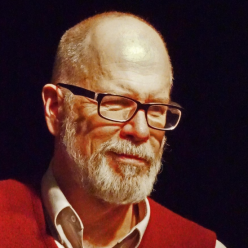A friend recently took me to task for telling improv students to “celebrate failure.”
“You don’t mean ‘celebrate failure,’ ” she said. “You mean ‘celebrate risking failure.’ ”
That conversation was a couple of weeks ago, and I’ve been thinking about it ever since. Here’s my conclusion: I mean both. Certainly I need to celebrate my willinglness to risk failure, because risking failure is the only reliable path to creative success. This part is easy, and is, I think, where I often stop in my thinking. I have indeed often invoked the phrase “celebrate failure” when I really mean “celebrate your willingness to risk failure in pursuit of success.” But actual failure? The result of the experiment that bombs? Do I really advocate celebrating that?
The answer is yes. It is very helpful to celebrate failure. The answer, if I am really truthful, is that I haven’t celebrated my own failures in life enough. But I am getting better at it. Why do I think it’s helpful, and why haven’t I done it enough? There are many reasons.
If I don’t first accept, then celebrate my failure, I risk denying that failure, and I minimize the possible learning to be gained. But if I say, in effect, “wow, yay me! I tried that new way to make crepes, and it was a train wreck! Woo Hoo! I’m covered with pancake batter from head to toe! ” a couple of things happen. First of all, my sense of humor is one of the most important tools in my personal toolbox, and I must be able to laugh at myself. When I can’t, even I can’t stand being around me. Secondly, that sense of humor often reveals analysis that is important. For me, honest humor is a big part of learning.
Babies learn to walk by falling down. They do not learn to walk by risking a fall—they learn by falling. The fall tells them what “too far in that direction with the center of gravity” is. So they fall sideways, and to the other side, and backwards, and forwards…imagine if a baby labelled himself “a failure” after just a few falls? They don’t, because babies are naturally celebratory beings. This is not to say that they don’t let us know that it hurts, dammit, when they give themselves a good clunk on the head during one of their trials. But they get back up. So perhaps in this sense, “Celebrate failure” means “I celebrate the me that continues to learn from failure. I celebrate the fact that I WILL learn this walking thing.”
A number of years ago I was talking with a friend about a very successful corporation. The friend, who had a bit of an axe to grind, referred to the CEO with some distain, and said “he collects failures.” I asked what he meant? “He finds people who have gone down in flames, and hires them. Look at his management team. Every one of them had a big crash in their past. He does it because then he can get them for cheap. They feel so bad about themselves that they will work for way less than successful managers would.” I didn’t buy my friend’s premise, though he listed several previous failures on the part of people on the management team.
First of all, my friend was nursing a grudge, and framing his remarks in a negative way. Secondly, however, as I said, the corporation in question is very successful. I can’t imagine that it would be if it were led by someone who collected “failures” with such low self esteem that they would work cheaply. (How would he even do that? Is there a special headhunter that looks for people who are full of self loathing?) I imagine that the CEO is wise enough to hire people that have failed for his management team because he knows that failure can be a great indicator of creativity, bravery, and dynamic, action-based thought. I further imagine that he doesn’t have much interest in the very safe individuals who have neither failed much, nor succeeded much, but simply exist to serve a status quo created by someone more adventurous than themselves.
In the improv classes, the instruction we give that my friend objected to is that our students take a “circus bow” when they try and fail. We use the example of the trapeze artist who fails in front of thousands….she falls to the net, flips onto the floor, and springs up, arms stretched out, in a gymnast’s bow. The very posture is celebratory–and we give her a huge ovation. Why? Because she was brave, and skilled, and she tried something we would never have the courage to try ourselves. We know that this time she didn’t do it, but she can. We know, from observing her failure, that she is inherently a success.
So why don’t I celebrate my own failures enough?
Back to the baby. It hurts, that clunk on the head. And that pain can drive any celebration out of the mind. But in the baby’s case, there’s a step two. He says to himself (in baby language, of course) “You know, that last time, I felt a little catch in my stomach, like the muscles there were trying to hold my weight from going backward, just before I fell back and clunked this noggin. So, if those muscles were a little stronger, If I tensed them earlier…then do that alternate the feet thing, and then…walking! Bob’s yer Uncle!” (Baby language is heavily influenced by 20th Century British slang.) “Yay, me!” says the baby. “I’ll get this walking thing in no time!”
In my own case, I sometimes stop at the “damn that hurts” phase. I forget the learning part. And that makes me forget to celebrate. When I stop at the pain, I forget to celebrate. I open the door to the saboteur voice in my head. When I feel the pain, acknowledge it, and then celebrate, I learn. And then, lo and behold…I succeed.


“I have not failed. I’ve just found 10,000 ways that won’t work.”
Is celebrating the learning you get from failure the same as celebrating failure? I’m not sure, but I am sure that there are few things more important to celebrate in the world than learning. When I screw up, I try to remember to say the mantra “Live And Learn!” acknowledging that I have given myself the gift through failure.
Showing the guts to risk public failure is certainly something to celebrate. We definitely need to honour those who take the risk to do something marvellous for us, encouraging them to bow deeply and accept our applause. After all, if we don’t encourage people in taking risks for us, how will they ever be able learn to do magnificent tasks, tasks like the walking we all now take for granted?
It’s easy to encourage a baby in attempting the difficult, but once people get old, we often think that they “should know better” and not take risks.
Nonsense!
Celebrate new learning, yes. Celebrate risking the audacious to claim the better, absolutely.
To me, though, failure is is just part of the risk/attempt/learn/master process, and it’s the process I celebrate.
You are right, though. There is no way to celebrate that process without celebrating all the bits of it. And that means celebrating failure, too.